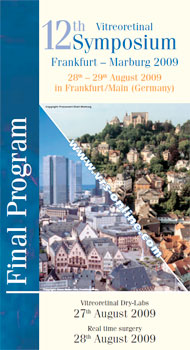12th Vitreoretinal Symposium Frankfurt – Marburg 2009
Scientific programm: Abstract
3rd scientific session: Age Related Macular Degeneration
20. Core Vitrectomy Using Intrector Combined with
Bevacizumab in Treatment of Choroidal
Neovascularization in AMD – Own Experience
 Slawomir Cisiecki (Lodz)
Slawomir Cisiecki (Lodz)
Aim of study: to evaluate effectiveness and safety of core vitrectomy with intrector and simultaneously injection of 1,25 mg bevacizumab in cases of nevascularization in AMD and to determine the state of posterior vitreous attachment in exudative, nonexudative age related macular degeneration and controls.
Methods: 26 eyes of 25 patients with diagnosis of cnv secondary to AMD, who underwent core vitrectomy using IntrectorÒ with 1,25 mg bevacizumab (AvastinÒ) between January 2008 and December 2008 were included in this study. Core vitrectomy using intrectorÒ was indicated when was no respond for three monthly intravitreal bevacizumab 1.25 mg injections or in cases of identified by SOCT no completely detached hyaloid . Early Treatment Diabetic Retinopathy Study best-corrected visual acuity (BCVA), foveal center thickness (FCT) on spectral optical coherence tomography (SOCT), and fluorescein angiographic findings were examined before and after treatment. Patients were followed up to 12 months. Spectral optical coherence tomography, combined with simultaneous scanning laser ophthalmoscope, fluorescein angiography (SpectralisÒ OCT/SLO Heidelberg Engeenering) and ultrasound examination (Alcon, 10Mhz probe) was performed in 335 eyes of 300 patients, with diagnosis of AMD, and 99 control eyes. All eyes were divided into 4 groups. 1. Group of 89 eyes with exudative AMD; 2. Group of 112 eyes with exudative AMD after anty-Vegf treatment; 3. Group of 134 eyes with nonexudative AMD and 4. Group with 99 control eyes.
Results: The mean BCVA (Snellen equivalent: 0,1) before treatment improved to 0.3. In 10 eyes BCVA remained unchanged and 3 from treated eyes experienced a worsening of BCVA from baseline. This reduction in FCT after treatment was observed in 23 eyes. Completely vitreous detachment in SOCT was possible to identify in 3 eyes. 4 eyes that had CNV closure experienced recurrence at 12-month follow-up. In 22 eyes throughout follow up, based on OCT findings, there were no symptoms of progression of cnv. No ocular or systemic adverse effects from treatment were encountered. Completely vitreous adhesions to posterior pole and to the optic disc were observed in 52 % in groups with exudative AMD (Group 1 and 2), 11% in eyes with nonexudative AMD (Group 3) and in 42% in control eyes (Group 4). Persistent central vitreoretinal adhesion surrounded by a detached posterior vitreous cortex (VMT – vitreomacular traction syndrom ) was detected in 51% in eyes with exudative AMD (Group 1,2 higher than in nonexudative AMD (33%); and in controls (34%).
Conclusion: These results of intravitreal bevacizumab with simultaneously core vitrectomy using IntrectorÒ are very promising with no apparent short-term safety concerns. In 23 treated eyes we observed stabilization or improvement in visual acuity (VA). OCT findings, as well, showed in these cases no reaccumulation of fluid. Treatment resulted in complete absence of angiographic leakage in 95% of eyes. Further studies will be needed to better determine long-term efficacy, safety and to evaluate more precisely role of vitreous liquefaction or detachment in pathogenesis of AMD.
Hyaloid adhesion to the macula is suspected to play an important role in the pathogenesis of different forms of age-related macular degeneration (AMD). VMT – vitreomacular traction syndrom is frequently associated eyes with CNV. Future studies are needed to define the exact role of vitreoretinal tractions as another factor in pathogenesis of cnv.
Copyright © VRS-online, 1999-.
All rights reserved. Impressum, rechtliche Hinweise
HTML & Webdesign: SPALLEK.COM
